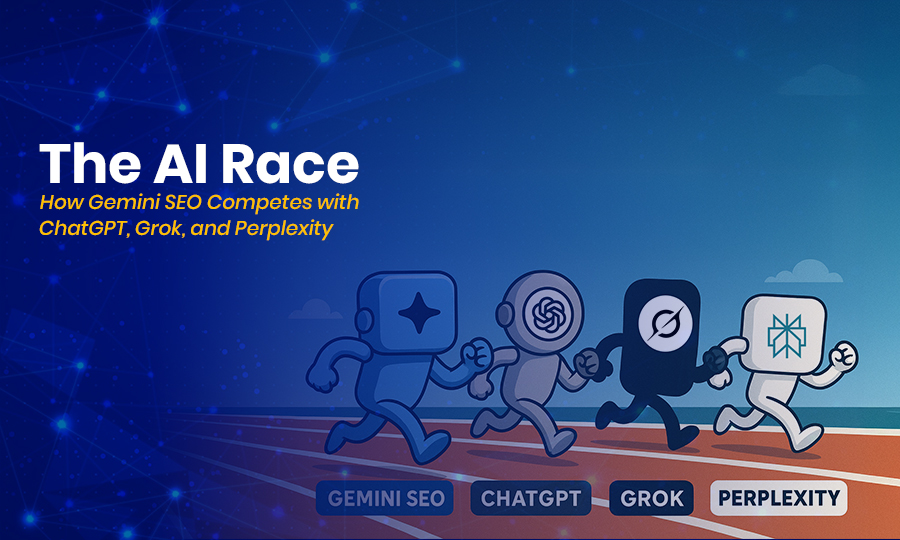The landscape of search engine optimization efforts has fundamentally transformed over the past few years. Almost over 2 billion people are currently using AI Overviews; research reveals that conventional click-through rates have fallen by over 35%; therefore, AI SEO tool comparison is no longer optional it’s a must-have for digital marketers, agencies, and companies to invest in online prominence.
In the past year, Google’s Gemini AI robot has more than doubled its web traffic. It now gets 12.9% of all hits to creative AI tools, up from 6.4% in 2024. Although it still controls 74% of chatbot web traffic, ChatGPT’s market share has decreased from 87% to 74%, indicating that rivals are effectively undermining OpenAI’s hold on the conversational AI space.
Grok offers real-time social integration with X, while Perplexity provides citation-focused outcomes with premium audience engagement. Each platform has unique algorithms, ranking variables, and content preferences that need optimized techniques.
As zero-click searches become more common, the businesses that modify their content strategies now will have the most visibility. If you’re relying on outdated SEO strategies, you’ll lose traffic. So you need to optimize content for AI tools like Gemini, ChatGPT, Perplexity, and Grok. You need to make sure that those AI-powered platforms cite your website whenever needed. Moreover, in this guide, you will discover how Gemini will be beneficial for your online visibility and how you can take help from Gemini SEO to rank your website on AI engines. Furthermore, you will learn the Gemini SEO strategies to compete with other AI SEO tools. Moreover, you will get to know about basic tools to optimize your content creation and keyword research for Gemini SEO and other SEO tools. So let’s dive into the strategies and tools needed to keep your brand ahead in the rapidly evolving landscape of AI search optimization.
What is Gemini SEO & Why Should Gemini SEO Compete With Other AI Tools?
Gemini SEO is the process of utilizing Google’s AI-based system to enhance your website’s visibility in search results. Gemini SEO examines how well your content answers people’s real questions, which is different from regular SEO methods. Traditional SEO focuses only on keywords and backlinks. But Gemini uses artificial intelligence to understand search intent, content quality, and how users interact with your page.
Gemini is part of Google’s AI system that connects with Google Search. This means that your content needs to be ready for both AI-based answers and traditional search engine rankings. When someone searches with Gemini or another AI SEO tool, the system can give them a summary of the information. So, if your content is not optimized for AI, your website might not be included in those summaries — which means you lose visitors and exposure.
Gemini SEO needs to compete with other strong AI SEO tools such as ChatGPT, Grok, Perplexity AI, and Surfer SEO. Each tool is useful for a different SEO position:
- ChatGPT helps you create content and find keywords quickly.
- Grok focuses on trending, real-time data from social media.
- Perplexity AI gives quick answers and citations from different websites.
- Surfer SEO analyzes top-ranking pages and helps you improve your on-page optimization.
When Gemini SEO competes with these top AI SEO tools, it makes you write better, more organized, and more useful content. The goal is to attract search engines and give AI systems the right signals to feature your site in AI summaries and improve your search engine rankings.
In short, Gemini SEO matters because the future of SEO is AI-powered. So the businesses need to start adapting AI-focused optimization and have to stay ahead in all search engines.
What Is The Current AI Search Engine Landscape?
Search engines have come a long way since 1990. The first search engine was called Archie, created by Alan Emtage, a student at McGill University. Archie was very basic. It only searched for file names on computer servers. It could not even search full web pages. This was before Google, before websites, and even before the World Wide Web became popular.
Fast forward to 1998, and Google changed everything. Google made search smarter by looking at which websites other sites linked to. The more links a website had, the more trustworthy Google thought it was. This made finding good information much easier.
But then something big happened in 2022. On November 30, 2022, OpenAI launched ChatGPT. This was different from any search engine before. Instead of showing you a list of blue links, ChatGPT talked to you like a human. It answered your questions directly. Within just five days, over one million people signed up to use it. Within two months, it reached 100 million users, making it the fastest-growing consumer application in history.
This changed the game completely. Now we have AI search engines that understand what you mean, not just what you type. They give you direct answers instead of making you click through ten different websites.
What Is AEO (Answer Engine Optimization)?
AEO stands for Answer Engine Optimization. Think of it as the new version of SEO. Traditional SEO was about ranking number one on Google’s search results page. AEO is about getting your content selected as the answer that AI tools like ChatGPT, Gemini, or Perplexity share with users.
Here’s how it works: When someone asks an AI search engine a question, the AI reads thousands of web pages in seconds. It then picks the best information and writes an answer in simple words. If your website has clear, helpful information, the AI might use your content to create that answer.
AEO means writing content that AI can easily understand and trust. This includes using clear headings, answering questions directly, and organizing information in a logical way.
What Is GEO (Generative Engine Optimization)?
GEO stands for Generative Engine Optimization. It’s similar to AEO but focuses specifically on AI tools that generate (create) new content. Tools like ChatGPT, Gemini, and Grok don’t just find information—they write brand new answers by combining information from many sources.
GEO ensures these AI tools use your website, brand, or data when answering questions. It has developed recognition more than search ranking.
The key difference: SEO gets you traffic through clicks. GEO gets you brand mentions and authority even without clicks.
What Is Generative AI?
Generative AI refers to artificial intelligence that can create new content. This includes writing text, making images, generating code, or even composing music. ChatGPT is generative AI because it generates new sentences to answer your questions. It doesn’t just copy information—it understands context and writes original responses.
Traditional AI just analyzed data. Generative AI creates something new from that data.
Omnichannel SEO Strategies
One SEO plan covers all digital platforms, like websites, social media, voice searches, and AI search engines. This is called an omnichannel SEO strategy. The objective remains constant: to maintain brand visibility across all user touchpoints, including Google searches, Gemini inquiries, Perplexity checks, and Grok-powered social media browsing.
You can’t effectively cover all those systems with a single-channel SEO campaign. Omnichannel SEO makes sure that one piece of content continuously complies with search engine rankings, technical SEO, and AI-powered outcomes. A well-connected omnichannel plan helps content remain discoverable, reliable, and adaptable as search shifts from simple keywords to intelligent answers.
Why Is This Important?
The shift from traditional search to AI search is massive. Here’s why it matters:
- Zero-click searches are rising- More people get their answers directly from AI without clicking on any website. This means less search traffic for websites, even if they have great content.
- Brand exposure matters more than rankings- AI tool mentions are worth more than Google #1. If ChatGPT suggests your product or cites your article, most people will believe in its reliability and worth.
- The rules have changed- Traditional SEO tactics like keyword stuffing don’t work with AI. AI understands meaning, not just words. You need to focus on quality content that genuinely helps people.
- Competition is fierce- Companies like Google, OpenAI, Microsoft, and X (Twitter) are all fighting to dominate AI search. Each platform has different strengths and weaknesses.
Traditional SEO vs. AI Search Optimization: Key Differences
| Aspect | Traditional SEO | AI Search Optimization (AEO/GEO) |
| Goal | Rank high on the search results page | Get cited or mentioned in AI answers |
| Success Metric | Click-through rate (CTR) and traffic | Brand mentions and citation frequency |
| Content Focus | Keywords and backlinks | Clear answers and structured data |
| Result Format | List of blue links | Direct conversational answers |
| User Behavior | Clicks through to websites | Gets an answer without leaving the AI tool |
| Ranking Factors | PageRank, backlinks, and domain authority | Source quality, answer relevance, and freshness |
| Optimization Strategy | Keyword research and link building | FAQ format, schema markup, E-E-A-T |
| Traffic Type | Direct website visits | Brand awareness and authority |
| Content Length | Long-form (1,500+ words) | Concise, scannable sections with clear headings |
| Update Frequency | Periodic updates | Real-time or daily freshness matters more |
AI SEO Tools Comparison: Gemini vs ChatGPT vs Grok vs Perplexity
| Feature / Factor | Gemini (Google) | ChatGPT (OpenAI) | Grok (X / Elon Musk) | Perplexity AI |
| Main Purpose | Gemini acts as Google’s AI search engine, designed to connect AI search with traditional search engine rankings. | ChatGPT serves as a conversational model that helps users plan, write, and analyze SEO tasks and keyword research. | Grok focuses on real-time social data and trends from X (Twitter), showing instant answers powered by AI SEO tools. | Perplexity works as an answer-focused AI search engine that summarizes web results with direct sources. |
| Data Source | Google’s search index, Google Search Console, and web crawlers. | OpenAI’s model training data is mixed with plugin or web access (depends on version). | Social media data and public posts from the X platform. | Live web data and trusted publications that allow citations. |
| Search Behavior | Gemini connects AI search engines with Google’s ecosystem to improve technical SEO and structured results. | ChatGPT acts more like a helper tool for content creation, not a full search engine. | Grok highlights trending conversations and social signals, giving a different view from standard SEO tools. | Perplexity provides direct answers, includes sources, and sometimes outranks normal search engine rankings. |
| SEO Advantage | Strong link with Google’s system, ideal for technical SEO and search engine rankings improvement. | Useful for planning keyword research, content outlines, and optimization ideas. | Good for brands that target real-time news or viral content visibility. | Best for factual summaries and citation-based visibility in AI search results. |
| Accuracy Level | Very high, due to access to Google’s real search data and verified web sources. | High for general use, but it depends on data freshness. | Moderate, since focus is on social trends rather than verified SEO data. | High, as it provides citations and transparent web links. |
| AI SEO Tools Use Case | Perfect for best AI SEO practices, schema setup, structured snippets, and visibility tracking through Google Search Console. | Great for automation of SEO tasks and keyword research strategy building. | Useful for content discovery and understanding trending user behavior. | Effective for AI SEO tools comparison and analyzing what type of content AI engines prefer. |
| Ideal For | Marketers, webmasters, and brands focused on AI-powered search visibility. | Writers, SEO professionals, and businesses are building optimized content. | Influencers, digital marketers, and brands use social signals for quick reach. | Publishers, researchers, and content creators who value data-backed summaries. |
| Drawback | Still under integration, with limited public access in some regions. | Limited real-time search accuracy without external tools. | Restricted to social network data and lacks deep website coverage. | Sometimes misses context in creative or niche topics. |
| Best Use Strategy | Combine with Google Search Console data to track search engine rankings. | You can take advantage of it for brainstorming and improving the SEO tools. | Use for detecting viral topics and instant visibility. | Apply it for citation-friendly summaries and quick factual authority building. |
Gemini serves as a link between conventional Google SEO and artificial intelligence search. ChatGPT is like a virtual assistant that helps you with AI writing and generates keyword ideas, and does deep research for your topic.
Grok reflects what people discuss on social platforms, while Perplexity gives clean, cited answers for modern AI search engines.
The best way for businesses to use AI for SEO is to integrate Gemini’s accurate data, ChatGPT’s creativity, Grok’s knowledge of trends, and Perplexity’s ability to find relevant sources. Together, these AI SEO tools create a balanced strategy that helps websites grow in both AI-based answers and classic search engine rankings.
How Gemini SEO is Changing the Game?
It is not enough to optimize for a single platform if you want to win the fight for exposure in AI searches. Search rankings will still be important, but they now have two functions: They affect both human users and the AI systems that provide real-time answers. It’s essential to understand both platform-specific strategies and general optimization principles to determine how Gemini SEO competes with ChatGPT, Grok, and Perplexity.
- Gemini SEO: Platform-Specific Optimization Tactics
- Gemini is a fundamentally different LLM from ChatGPT, Grok, or Perplexity because it powers the entire SERP, not just AI Overviews. An advanced artificial intelligence system that has been trained on large amounts of text data to comprehend, produce, and forecast language that is similar to that of humans is called a Large Language Model (LLM). It powers tools like ChatGPT and Gemini, enabling tasks such as AI writing, summarization, and SEO content optimization.
- For Google AI overview optimization, you should focus on multimodal content. Gemini understands text, images, videos, charts, and documents, and all of these things are part of the search experience. In contrast to ChatGPT’s text-heavy methodology, Gemini actively gives visual components in citations top priority.
- ChatGPT is great at handling text, and Perplexity is good at checking the quality of citations. Gemini 2.5 can handle a lot of different inputs, like looking at a picture for a visual question or writing code from a suggestion. So that content optimization experts apply the top AI SEO tools to incorporate visual components. It is essential for AI search visibility and is not an option.
- Initially, AI Overviews will use Gemini 2.0 to generate responses for U.S. users when they enter coding or advanced math questions. The model series will also be activated in response to multimodal queries. This creates unique opportunities for technical content creators and agencies managing multiple websites with diverse content types.
- Therefore, you need to structure content for “query fan-out. In order to interpret prompts, AI Mode employs a method called query fan-out, which compiles the results of multiple searches into a single response. Your chances of being cited in Gemini’s integrated responses will increase if you generate comprehensive content that addresses related questions in the same article.
- Query Fan-Out Creates Comprehensive Citation Opportunities
- AI Mode uses a technique called “query fan-out” to process prompts. It will conduct multiple searches and then combine the results into a single response. This technique revolutionizes how Gemini evaluates content authority. Google co-founder Sergey Brin describes this as the AI retrieving the top thousand search results, then running follow-on searches to refine and analyze them.
- For agencies managing multiple websites, this creates strategic advantages. For Gemini SEO to work successfully, you need to build comprehensive topic clusters instead of optimizing single pages for short keyword lists. When Gemini performs query fan-out, it looks for sources that address multiple facets of a query. Your content should answer related questions within the same resource, increasing citation probability exponentially.
- The best SEO tools, like SE Ranking and Semrush, now include AI platform tracking features specifically designed to monitor query fan-out patterns. Businesses can check their rankings on multiple search engines with OmniSEO®. This provides them with important information for determining which content structures receive the most Gemini citations.
- Context Windows Enable Document-Level Understanding
As a result, an internal linking strategy becomes even more important for optimizing content. Other AI SEO tools like Screaming Frog and Sitebulb help identify broken internal links and orphaned pages that prevent Gemini from fully understanding your site’s topical authority.
Gemini 2.5 Pro’s extensive context window currently supports 1 million tokens with a planned expansion to 2 million tokens in the near future. This enormous capacity enables Gemini 2.5 Pro to analyze and interpret big information, including long documents (up to 1,500 pages with a 1M token window). This feature changes SERP analysis fundamentals.
Traditional search engine optimization focused on individual page optimization. When you do Gemini SEO, you have to think about whole content ecosystems. The AI can go through your whole website’s structure and figure out how articles relate to each other, how well topics are covered, and how often new content is added across your whole domain.
- Real-Time Freshness through Daily Index Updates
- Gemini already uses real-time search integration to retrieve content and responses from the high-ranking webpages for a query, in contrast to ChatGPT’s static knowledge cutoff. Most importantly, you need to remember that Gemini gives importance to content that reflects the latest knowledge. An updated 2025 guide will typically outperform a static 2022 article, especially for topics where timeliness matters.
- This fundamentally changes content strategy for managing multiple sites. It is no longer possible for publishers to produce evergreen content and overlook it. The content creation process must include scheduled update cycles. The best AI SEO tools now include content decay monitoring, alerting you when articles fall behind competitors in freshness signals.
- Google Analytics users must now keep an eye on both organic search traffic and AI referral traffic to assess how well their content is doing. If you are already using Google Analytics or Google Search Console, Gemini AI can easily integrate. This provides real-time insights and recommendations based on Google’s actual search algorithms.
- E-E-A-T Signals Dominate Gemini’s Trust Algorithm
- E-E-A-T (Experience, Expertise, Authoritativeness, Trustworthiness) signals are the most important factor for Gemini citations. Google Gemini prefers content that demonstrates clear expertise through author credentials, firsthand experience, and authoritative sources. This creates challenges for content produced by generic AI writing assistant tools without a human expertise overlay.
- Gemini’s AI-generated answers perform better when the content is readable and supported by E-E-A-T principles. For search intent optimization, every content needs apparent expertise signals: detailed author bios with credentials, original research or case studies, citations from authoritative sources, and evidence of real-world experience.
- The best SEO AI tools for E-E-A-T optimization include backlink analysis platforms like Ahrefs and Moz, which help identify opportunities to earn citations from trusted sources that Gemini recognizes as authoritative. Other AI SEO tools, like MarketMuse, analyze topical authority gaps compared to competitors.
- Structured Data Requirements Intensify
Your content structure has a direct effect on how you will appear in AI responses and featured snippets. For on-page SEO, schema markup implementation is very important. In all AI platforms, Gemini is more dependable at processing structured data than unstructured content.
These days, the best AI SEO tools come with schema generators that are optimized for Gemini SEO. FAQ schema, HowTo schema, Article schema, and Product schema all improve how Gemini interprets and cites your content. Schema markup highlights the exact pieces of information that might answer a query. For example, a recipe page with proper schema tells Gemini exactly where to find cooking times, ingredients, and instructions.
Other tools, such as Schema.org validators, may help with keyword suggestions and content optimization. Google Search Console now reports structured data errors that specifically impact AI Overview eligibility.
- Meta Descriptions and Meta Tags Gain New Importance
Meta descriptions are frequently used as synopses that AI can incorporate straight into citations. Meta descriptions were considered optional ranking factors in traditional SEO, but Gemini SEO makes them mandatory for AI search visibility. So you need to write 150-160-character summaries that function as complete answers. Moreover, the ideal word count for meta tags should be 55-60 characters. Your meta tags should be precise, short, and related to your actual content topic.
For content optimization across AI platforms, test meta descriptions separately from page titles. These days, other AI SEO tools like Yoast SEO and Rank Math offer AI-specific meta description analysis, which assesses how well your summaries perform for both AI citations and conventional SERP snippets.
How ChatGPT, Perplexity, and Grok AI Are Relevant in an AI Search Engine?
In this segment, you will discover some basic key features of ChatGPT, Perplexity, and Grok AI, so that you can get an idea of how gemini SEO can compete with these AI-powered tools.
Gemini Versus ChatGPT: The Integration Advantage
- While ChatGPT is a separate platform, Gemini is not a supplementary tool. It’s integrated into the areas you already work, such as Google Docs and Sheets. A 24/7 assistant, Gemini improves workflows and correlates content with Google’s needs. This integration creates unique optimization benefits.
- Gemini in Docs speeds up the planning process and ensures each piece is strategically aligned with SEO goals for businesses. It’s developed by the same company, so the auto-writing assistant understands Google’s ranking preferences. This gives Gemini-optimized content natural advantages in Google AI overviews.
- ChatGPT requires manual web browsing and lacks direct SERP access. Grok provides X (Twitter) integration but limited broader web visibility. Perplexity excels at citation transparency but lacks ecosystem integration. Only Gemini combines real-time search data, multimodal understanding, and native integration with the world’s dominant search engine.
ChatGPT Optimization: Authority and Clarity
- ChatGPT gives preference to reliable sources with obvious signals of expertise. For on-page SEO strategies, you need to ensure your author bios demonstrate real-world experience. Then you need to present credentials, publications, and specific accomplishments that convey topical authority.
- ChatGPT prefers conversational writing with professional depth. So you should avoid overly academic language, but don’t sacrifice accuracy for simplicity. The AI accepts varied expertise and preference sources that explain complex topics clearly without dumbing them down.
- For content creation process optimization, structure articles with a clear logical progression. Therefore, you need to use transitional phrases that help AI understand relationships between ideas: “This leads to…”, “As a result…”, “Building on this concept…”
Perplexity Optimization: Source Quality and Data
- Perplexity highlights citation transparency more than any other platform. For backlink analysis, you need to prioritize earning links from sources Perplexity already trusts, such as major publications, academic institutions, and established industry authorities.
- Moreover, you can add specific data points, statistics, and research findings throughout your content. Perplexity actively seeks quantifiable information to support its answers. When mentioning statistics, always cite sources and include publication dates.
- For meta descriptions, you can write strong summaries that work as standalone answers. Perplexity often pulls meta descriptions directly into citations when they provide simple, short context about page content.
Grok Optimization: Real-Time and Trending Content
- Grok’s integration with X (Twitter) makes timeliness paramount. For agencies managing multiple websites, Grok offers advantages for breaking news coverage and trending topics. Then you need to update content frequently with current developments, adding timestamps and “last updated” dates prominently.
- Moreover, you should use conversational, personality-driven writing that helps with social media communication styles. Grok prefers content that is authentic and engaging over purely informational. This doesn’t mean sacrificing accuracy—combine solid facts with accessible presentation.
Universal Content Optimization Strategy That Works Across All Platforms
- Traditional SEO tactics like keywords, backlinks, and algorithm manipulation won’t be enough. Companies should concentrate on conversational relevance and structured, rich content if they want to remain relevant. So you need to start to understand the search intent behind every query. Your content must answer the “why” behind searches, not just the “what.”
- The content should be well structured and conversational, and answer all real user queries. Moreover, you can think of rich FAQs, clean schema, and value-dense white papers. If your content isn’t LLM-friendly, you’re invisible in the next wave of search. Therefore, you need to use the FAQ schema, the HowTo schema, and the Article schema frequently across all properties.
- You need to answer all queries within the first 50 words, then expand with supporting context. This format works for managing multiple sites because it creates scannable, modular content that AI platforms extract regardless of specific topics.
For content creation and search intent analysis, you can take help fromSurfer SEO and Clearscope. These tools remain powerful content optimization tools for identifying what AI platforms value. These AI SEO software solutions analyze top-ranking content in traditional search and are increasingly incorporating AI search patterns.
Which AI SEO Tool Should You Choose?
Here, I discuss some AI-powered tools and the steps to get the best results for SEO performance.
- SEMrush AI SEO Toolkit
Best For: Comprehensive keyword research functionality, SEO audits, and AI visibility tracking across multiple platforms.
Why Choose It:

The AI keyword research and analysis tools from Semrush are revolutionary for identifying profitable, high-quality keywords that you can rank for. Semrush Copilot provides recommendations about your website’s SEO, including suggestions on technical issues, keyword opportunities, dropped keywords, competitor ranking changes, lost backlinks, broken pages, and organic visibility drops or increases.
Step-by-Step Usage:
Step 1: Set Up Your Dashboard
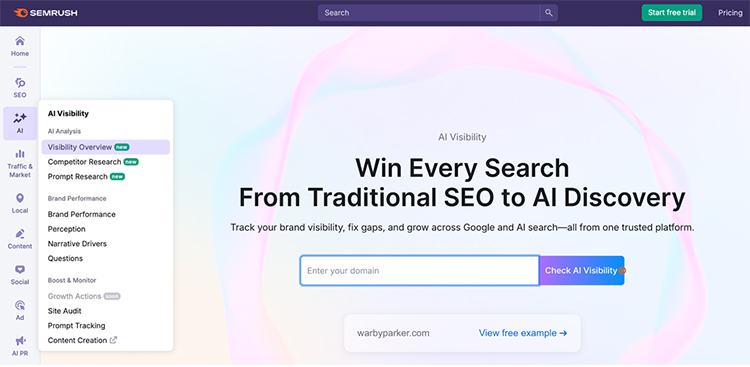
- First, you need to create a Semrush account (14-day free trial available).
- Then you can add your website domain to the Project section.
- Connect Google Analytics for integrated performance tracking.
- Moreover, you need to set your geographic target locations and competitor list.
Step 2: Conduct Keyword Research
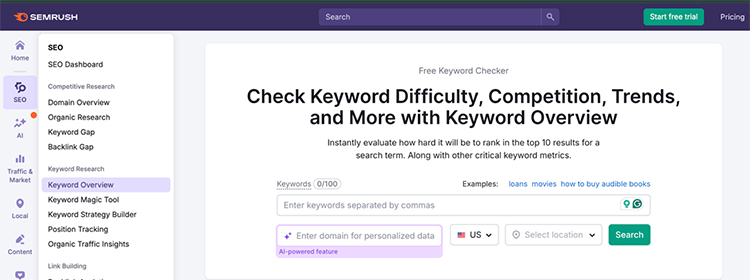
- Navigate to Keyword Magic Tool. This is one of the best keyword research tools.
- Enter your seed keyword related to your niche.

- Use SEMrush’s PKW% (personalized keyword difficulty percentage), which adjusts the ranking difficulty score of keywords based on your website’s topical authority and current rankings.
- Filter results by keyword data, including search volume, difficulty, and search intent.
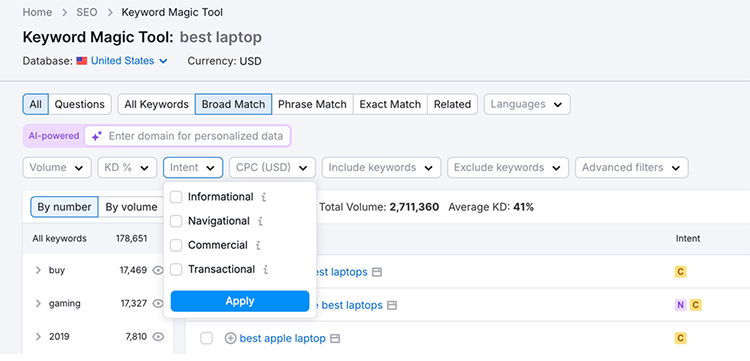
- Then you can export high-potential keywords to rank your content higher.
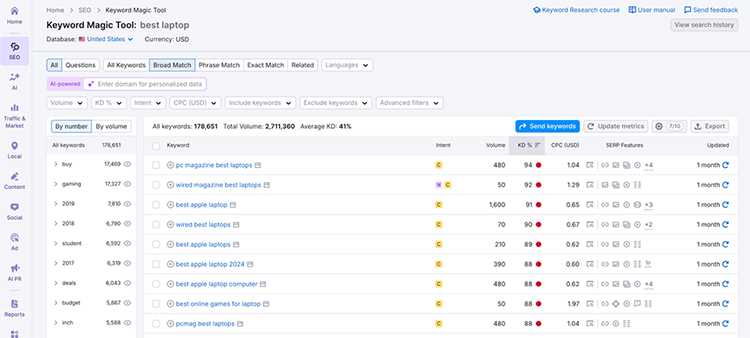
Step 3: Analyze Top Ranking Pages

- Then you can use the “Organic Research” tool to identify your top-ranking pages.
- It can do rank tracking for your target keyword and show you which keywords your rivals use but you don’t. So you can choose them and integrate them into content creation.
- Moreover, you can review which pages rank in Google AI overviews.
- Identify content gaps where competitors rank but you don’t.
Step 4: Run Technical SEO Audits
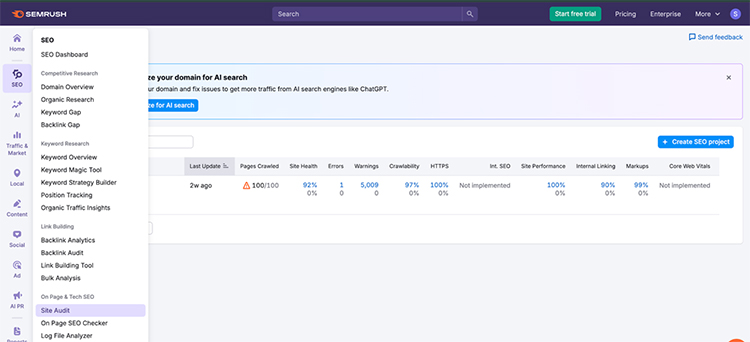
- Access the Site Audit tool from your project dashboard
- Run a comprehensive crawl of your website (up to 100 pages on free trial)
- Review technical issues: broken links, slow page speed, mobile optimization problems
- Semrush Copilot notices important changes before you do and keeps you in the loop
- Prioritize fixes based on the impact scores provided
Step 5: Track AI Visibility
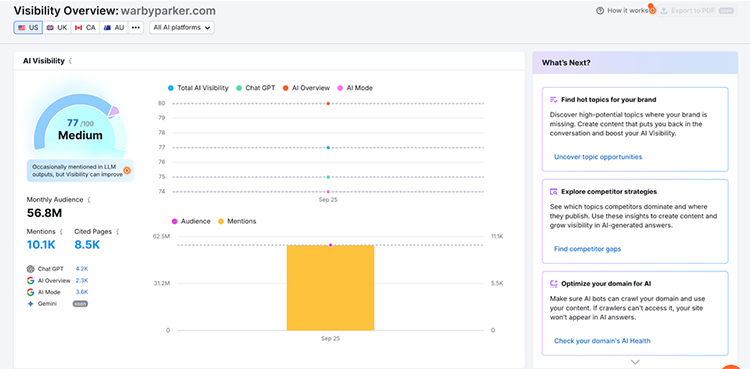
- Navigate to the AI SEO Toolkit section
- In the Domain Overview tab, see how many of your website’s keywords show up in Google’s AI Overviews and how many actually link back to the site audits.
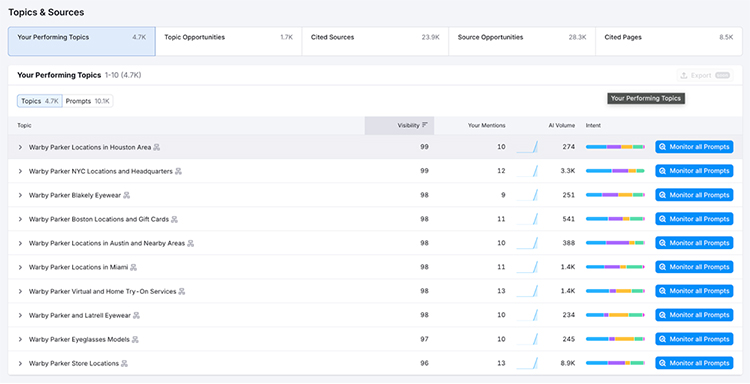
- Monitor brand mentions across ChatGPT, Gemini, and Perplexity
- Set up weekly alerts for AI visibility changes
Pricing: Starts at $139.95/month (Pro plan) with a 17% discount for annual billing
- Yext (Best for Local SEO)
Best For: It can manage Google business profiles, local search optimization, and multi-location citation management.
Why Use It: You can keep NAP data up-to-date and integrated across all platforms, including your own website, Google Business Profile, and more than 200 important citation sources, with Yext’s Listings and Pages. There was an average 186% increase in Google website clicks for location listings that had over 75% of the Yext publisher network synced.
Step-by-Step Usage:
Claim Your Business Listings
- You need to sign up for a Yext account (free plan available).
- Then you can establish your Google business profile through the Yext dashboard.
- Check ownership through Google’s verification methods.
Manage Reviews and Reputation
- You can set up review monitoring across Google, Yelp, and Facebook.
- Then you can create response templates for common review scenarios.
- Monitor sentiment analysis reports weekly.
- Address negative reviews within 24 hours for optimal reputation management.
Create SEO-Optimized Landing Pages
- Yext Pages lets you quickly create SEO-optimized landing pages by pulling structured data from Yext Content.
- Design location-specific pages for multi-location businesses
- Add FAQ sections targeting local search intent
- Include embedded Google Maps and driving directions
- Optimize meta descriptions for local queries
Pricing: Free plan available; paid plans start at $199/month for single locations
- Surfer SEO
Best For: On-page content optimization, SERP analysis, and real-time SEO recommendations.
Why Choose It: Surfer SEO is fast—it can evaluate search results and audit content quickly. It provides precise recommendations for internal linking and helps you to filter out irrelevant URLs from the analysis of search results.
Create Content Editor
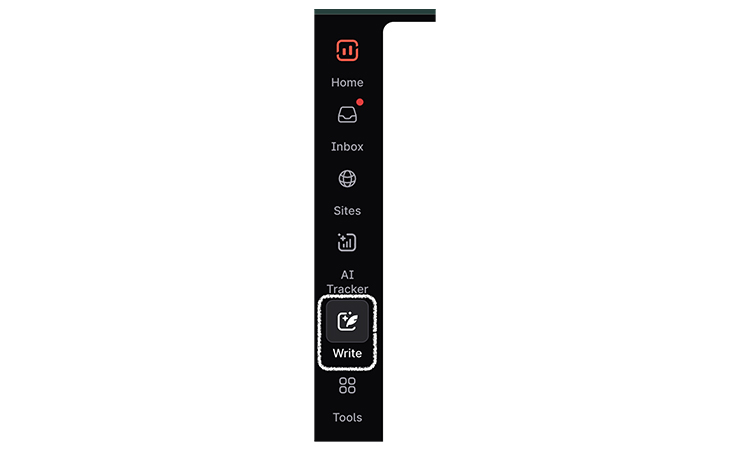
- Log in to the Surfer SEO dashboard.
- Then you need to go to the Content Editor.
- Enter your target keyword and location.
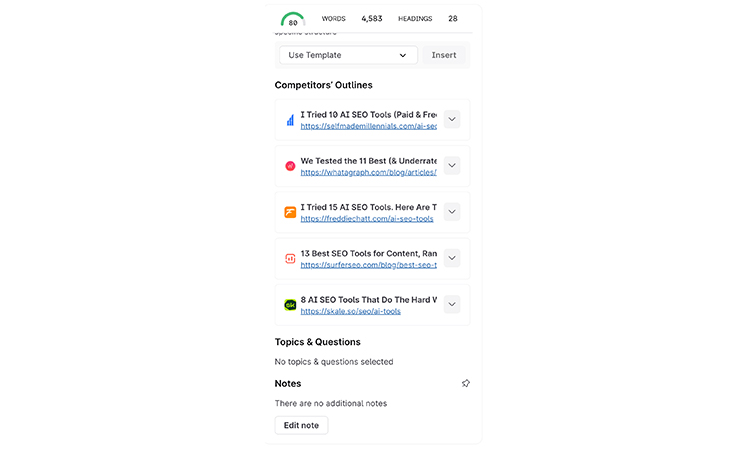
- Surfer analyzes top-ranking pages and generates optimization guidelines.
- Review recommended word count, keyword density, and heading structure.
- You need to paste your existing article into the content editor.
- Then you should review the content score (aim for 70+ for competitive keywords).
- Follow real-time suggestions for keyword placement.
- Add recommended headings and subheadings based on search intent.
- Integrate NLP terms and semantic keywords highlighted by the tool.
- SE Ranking (Best for AI Overview Tracking)
Ideal For: You can monitor Google AI overviews, competitive analysis, and keyword research.
Why Choose It: SE Ranking’s AI Overviews Tracker helps you monitor where—and how—you’re showing up in Google’s AI-generated answers. The tracker provides you with information about which keywords cause AI Overviews, whether your website is cited as a source, and how your performance compares to that of your rivals.
You can take any one of AI powered SEO tools to help optimize your content for any AI tools like Gemini, ChatGPT, Perplexity, and so on.
What Does the Future Hold for AI Search Optimization?
- The 2026-2028 Tipping Point- According to Gartner, by 2026, the volume of traditional search engines will decrease by 25% as more people use generative AI assistants, requiring competitor analysis that goes beyond Google rankings. As consumers fully embrace generative AI search by 2028, organic search traffic to websites will decrease by 50% or more. This transition requires immediate adaptation of SEO AI tool tactics.
- Gemini’s Integration Advantage Strengthens– Google commands 57% of the $300 billion global search advertising market, though this share is projected to decline as emerging search platforms gain traction in 2025 and 2026. However, Gemini’s deep ecosystem integration positions it uniquely. Gemini simply integrates with Google Workspace, Search, and AI Overviews, presenting unified optimization opportunities, in contrast to ChatGPT, Grok, and Perplexity, which function as distinct platforms.
- AI Agents Become Purchasers-ChatGPT released Agent Mode in July 2025, which is “bridging research and action” using the live web, performing tasks like buying recipe ingredients or booking flights. This transforms how AI-powered SEO tools must function. Your optimization tools must now ensure checkout processes work for autonomous AI agents, not just humans.
- A Unified AEO Strategy Emerges- As autonomous AI agents proliferate in search and decision workflows by 2026, we anticipate the emergence of a new optimization discipline. For success, it is required to use advanced SEO AI tools to proactively monitor SEO performance across all platforms. As the main statistic that replaces traditional rankings, observe how frequently your brand is mentioned, cited, or summarized in AI-generated results.
Frequently Asked Questions
No, AI SEO tools support experts by automating analysis and suggestions, but human insight is still needed for creativity, strategy, and understanding brand tone.
Yes, most AI SEO tools have simple dashboards, guided workflows, and templates, making them easy for beginners to use for keyword research and on-page optimization.
AI-powered SEO tools analyze data, detect keyword trends, and optimize content automatically to boost visibility, improve rankings, and match user search intent more effectively.
Let’s Conclude Our Discussion
So, we are at the end of our discussion of AI SEO tool comparisons; you have an in-depth knowledge of how Gemini, ChatGPT, Perplexity, and Grok can help you to optimize your content. Moreover, you have other AI tools that can help you track SEO performance.
Furthermore, now you have a clear idea of how your Gemini SEO can compete with other AI tools. So, you can make your website appear on Gemini without any hassle. Though you can do it on your own, if you take professional AI SEO services, you can get more advantages. Their professional SEO team can provide personalized strategies and ongoing support to ensure your website’s success on Gemini and other platforms. Furthermore, their expertise can help you stay ahead of the constantly altering algorithms and trends in the digital marketing landscape.

